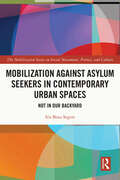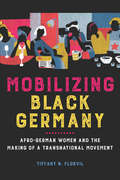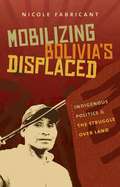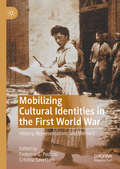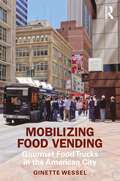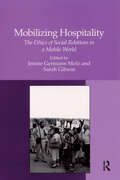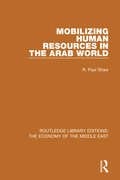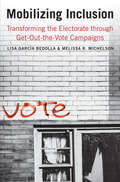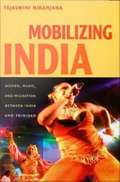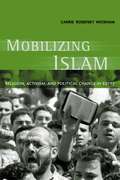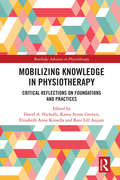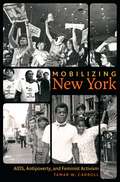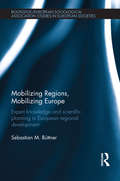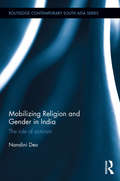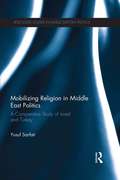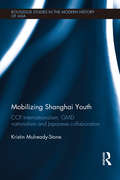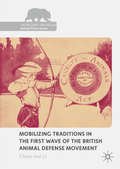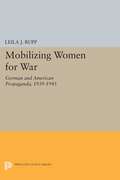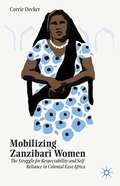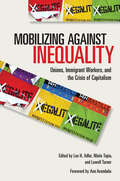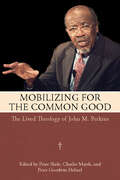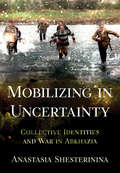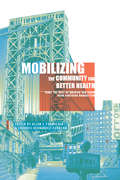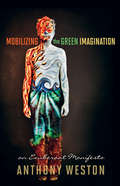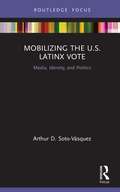- Table View
- List View
Mobilization against Asylum Seekers in Contemporary Urban Spaces: Not in Our Backyard (The Mobilization Series on Social Movements, Protest, and Culture)
by Iris Beau SegersThis book investigates the issue of local mobilization against asylum seekers in urban areas, which are often disproportionally affected by complex issues related to immigration and integration, as well as socio-economic development and growing inequalities. Based on ethnographic research in the city of Rotterdam, it explores the conditions under which mobilization against the establishment of an asylum seekers’ centre emerged, offering a combined analysis of interviews, social media, and mainstream media to demonstrate the key role played by storytelling in the development of opposition to the arrival of asylum seekers. Presenting a theoretical model of anti-immigration mobilization that connects the social importance of storytelling to broader socio-political developments and conditions, this volume will appeal to scholars of sociology, anthropology, and politics with interests in migration, social movements, and mobilization around contentious issues.
Mobilizing Black Germany: Afro-German Women and the Making of a Transnational Movement (Black Internationalism #6)
by Tiffany N. FlorvilIn the 1980s and 1990s, Black German women began to play significant roles in challenging the discrimination in their own nation and abroad. Their grassroots organizing, writings, and political and cultural activities nurtured innovative traditions, ideas, and practices. These strategies facilitated new, often radical bonds between people from disparate backgrounds across the Black Diaspora. Tiffany N. Florvil examines the role of queer and straight women in shaping the contours of the modern Black German movement as part of the Black internationalist opposition to racial and gender oppression. Florvil shows the multifaceted contributions of women to movement making, including Audre Lorde’s role in influencing their activism; the activists who inspired Afro-German women to curate their own identities and histories; and the evolution of the activist groups Initiative of Black Germans and Afro-German Women. These practices and strategies became a rallying point for isolated and marginalized women (and men) and shaped the roots of contemporary Black German activism. Richly researched and multidimensional in scope, Mobilizing Black Germany offers a rare in-depth look at the emergence of the modern Black German movement and Black feminists’ politics, intellectualism, and internationalism.
Mobilizing Bolivia's Displaced
by Nicole FabricantThe election of Evo Morales as Bolivia's president in 2005 made him his nation's first indigenous head of state, a watershed victory for social activists and Native peoples. El Movimiento Sin Tierra (MST), or the Landless Peasant Movement, played a significant role in bringing Morales to power. Following in the tradition of the well-known Brazilian Landless movement, Bolivia's MST activists seized unproductive land and built farming collectives as a means of resistance to large-scale export-oriented agriculture. In Mobilizing Bolivia's Displaced, Nicole Fabricant illustrates how landless peasants politicized indigeneity to shape grassroots land politics, reform the state, and secure human and cultural rights for Native peoples. Fabricant takes readers into the personal spaces of home and work, on long bus rides, and into meetings and newly built MST settlements to show how, in response to displacement, Indigenous identity is becoming ever more dynamic and adaptive. In addition to advancing this rich definition of indigeneity, she explores the ways in which Morales has found himself at odds with Indigenous activists and, in so doing, shows that Indigenous people have a far more complex relationship to Morales than is generally understood.
Mobilizing Cultural Identities in the First World War: History, Representations and Memory
by Federica G. Pedriali Cristina SavettieriThis book tackles cultural mobilization in the First World War as a plural process of identity formation and de-formation. It explores eight different settings in which individuals, communities and conceptual paradigms were mobilized. Taking an interdisciplinary approach, it interrogates one of the most challenging facets of the history of the Great War, one that keeps raising key questions on the way cultures respond to times of crisis. Mobilization during the First World War was a major process of material and imaginative engagement unfolding on a military, economic, political and cultural level, and existing identities were dramatically challenged and questioned by the whirl of discourses and representations involved.
Mobilizing Food Vending: Gourmet Food Trucks in the American City
by Ginette WesselMobilizing Food Vending investigates the gourmet food truck movement in the United States and provides a clearer understanding of the social and economic factors that shape vendor autonomy and industry growth. The book features case studies in a variety of American cities and uses top-down and bottom-up urban theory to frame a discussion of food trucks’ rights, displacement, and resiliency. Using ethnographic and archival research collected from industry experts, the book examines vendors’ operational strategies, their regulatory challenges when navigating the city, and their economic, cultural, and political roles in shaping urban space. Mobilizing Food Vending argues that food truck vendors are critical actors that support local economies and contribute to the public realm while shaping regulatory policy from the bottom up. This book will appeal to urban scholars studying the contemporary neoliberal city, the public realm, and communication technology and mobility, as well as to urban planners seeking to understand how vendors shape city plans and policies.
Mobilizing Hospitality: The Ethics of Social Relations in a Mobile World
by Sarah GibsonThe concept of ’mobility’ has sparked lively academic debate in recent years. Drawing on research from the fields of anthropology, geography, sociology and tourism studies, this volume examines the intersection between mobility and hospitality, highlighting the issues that emerge as we encounter strangers in a mobile world. Through a series of diverse empirical accounts, it focuses on the transnational movement of people in the contexts of migration and tourism and examines how hospitality serves as a way of promoting and policing encounters, questioning how these relations are marked by exclusion as well as inclusion, and by violence as well as by kindness. In addition to exploring the power relations between mobile populations (hosts and guests) and attitudes (hospitality and hostility), the book also examines spaces of hospitality and mobility, such as cities, hotels, clubs, cafes, spas, asylums, restaurants, homes and homepages. In doing so, it makes a significant contribution to the political and ethical dimensions of mobile social relations.
Mobilizing Human Resources in the Arab World (Routledge Library Editions: The Economy of the Middle East)
by R. Paul ShawR. Paul Shaw has travelled widely in the Arab world, obtaining data and gathering impressions first-hand from national and local planners. In this book, he identifies population and manpower problems that are likely to become more serious and more difficult to solve if they are neglected at this early stage of Arab development. He focuses on five broad areas which are directly or indirectly related to mobilizing human resources, and his book will be of special interest to all those who are concerned with such issues as population, migration, employment, inequality, the emancipation of women, construction and agriculture. Dr Shaw proposes policy directives which are sensitive to the problems as they are seen by the Arab governments themselves, and sets out practical guidelines which can be used by Arab planners and policy-makers. An important feature of the book with respect to current literature on Arab development is that it moves away from a preoccupation with growth-related investments to a concentration on development-related population, manpower and employment issues. By bringing together such comprehensive empirical and bibliographic information, it will also be invaluable as a reference source for some twenty Arab countries. First published in 1983.
Mobilizing Inclusion: Transforming the Electorate through Get-Out-the-Vote Campaigns
by Lisa Garcia Bedolla Melissa R. MichelsonWhich get-out-the-vote efforts actually succeed in ethnoracial communities—and why? Analyzing the results from hundreds of original experiments, the authors of this book offer a persuasive new theory to explain why some methods work while others don’t. Exploring and comparing a wide variety of efforts targeting ethnoracial voters, Lisa García Bedolla and Melissa R. Michelson present a new theoretical frame—the Social Cognition Model of voting, based on an individual’s sense of civic identity—for understanding get-out-the-vote effectiveness. Their book will serve as a useful guide for political practitioners, for it offers concrete strategies to employ in developing future mobilization efforts.
Mobilizing India: Women, Music, and Migration Between India and Trinidad
by Tejaswini NiranjanaDescendants of indentured laborers brought from India to the Caribbean between 1845 and 1917 comprise more than forty percent of Trinidad's population today. While many Indo-Trinidadians identify themselves as Indian, what "Indian" signifies--about nationalism, gender, culture, caste, race, and religion--in the Caribbean is different from what it means on the subcontinent. Yet the ways that "Indianness" is conceived of and performed in India and in Trinidad have historically been, and remain, intimately related. Offering an innovative analysis of how ideas of Indian identity negotiated within the Indian diaspora in Trinidad affect cultural identities "back home," Tejaswini Niranjana models a necessary project: comparative research across the global South, scholarship that decenters the "first world" West as the referent against which postcolonial subjects understand themselves and are understood by others. Niranjana draws on nineteenth-century travel narratives, anthropological and historical studies of Trinidad, Hindi film music, and the lyrics, performance, and reception of chutney-soca and calypso songs to argue that perceptions of Indian female sexuality in Trinidad have long been central to the formation and disruption of dominant narratives of nationhood, modernity, and normative sexuality in India. She illuminates debates in India about "the woman question" as they played out in the early-twentieth-century campaign against indentured servitude in the tropics. In so doing, she reveals India's disavowal of the indentured woman--viewed as morally depraved by her forced labor in Trinidad--as central to its own anticolonial struggle. Turning to the present, Niranjana looks to Trinidad's most dynamic site of cultural negotiation: popular music. She describes how contested ideas of Indian femininity are staged by contemporary Trinidadian musicians--male and female, of both Indian and African descent--in genres ranging from new hybrids like chutney-soca to the older but still vibrant music of Afro-Caribbean calypso.
Mobilizing Islam: Religion, Activism, and Political Change in Egypt
by Carrie Rosefsky WickhamMobilizing Islam explores how and why Islamic groups succeeded in galvanizing educated youth into politics under the shadow of Egypt's authoritarian state, offering important and surprising answers to a series of pressing questions. Under what conditions does mobilization by opposition groups become possible in authoritarian settings? Why did Islamist groups have more success attracting recruits and overcoming governmental restraints than their secular rivals? And finally, how can Islamist mobilization contribute to broader and more enduring forms of political change throughout the Muslim world? Moving beyond the simplistic accounts of "Islamic fundamentalism" offered by much of the Western media, Mobilizing Islam offers a balanced and persuasive explanation of the Islamic movement's dramatic growth in the world's largest Arab state.
Mobilizing Knowledge in Physiotherapy: Critical Reflections on Foundations and Practices (Routledge Advances in Physiotherapy)
by David A. Nicholls; Karen Synne Groven; Elizabeth Anne Kinsella; Rani Lill AnjumMobilizing Knowledge in Physiotherapy: Critical Reflections on Foundations and Practices is a collection of 15 collaboratively written critical essays, by 39 authors from 15 disciplines and seven countries. The book challenges some of the most important contemporary assumptions about physiotherapy knowledge, and makes the case for much more critical theory, practice, and education in physiotherapy health and social care. The book challenges the kinds of thinking that have traditionally bounded the profession and highlights the ways in which knowledge is now increasingly fluid, complex, and diffuse. The collection engages a range of critical social theories and interdisciplinary perspectives from within and without the profession. It includes sections focusing on evidence, practice, patient perspectives, embodiment, culture, diversity, digital worlds, and research methods. The book makes an important contribution to how we think about mobilizing knowledge, and it speaks to a diverse audience of academics, practitioners, educators, policy-makers, and students - both within physiotherapy and from a range of related health and social care disciplines. This book will be a useful reference for scholars interested in conceptions of professional knowledge, and the theory of professional education and practice in physiotherapy and beyond.
Mobilizing New York
by Tamar W. CarrollExamining three interconnected case studies, Tamar Carroll powerfully demonstrates the ability of grassroots community activism to bridge racial and cultural differences and effect social change. Drawing on a rich array of oral histories, archival records, newspapers, films, and photographs from post-World War II New York City, Carroll shows how poor people transformed the antipoverty organization Mobilization for Youth and shaped the subsequent War on Poverty. Highlighting the little-known National Congress of Neighborhood Women, she reveals the significant participation of working-class white ethnic women and women of color in New York City's feminist activism. Finally, Carroll traces the partnership between the AIDS Coalition to Unleash Power (ACT UP) and Women's Health Action Mobilization (WHAM!), showing how gay men and feminists collaborated to create a supportive community for those affected by the AIDS epidemic, to improve health care, and to oppose homophobia and misogyny during the culture wars of the 1980s and 1990s. Carroll contends that social policies that encourage the political mobilization of marginalized groups and foster coalitions across identity differences are the most effective means of solving social problems and realizing democracy.
Mobilizing Regions, Mobilizing Europe: Expert Knowledge and Scientific Planning in European Regional Development (Studies in European Sociology)
by Sebastian M. BuettnerRegional development strategies are becoming more similar all around Europe, even though regional differences are more pronounced than ever and many European regions have become more autonomous actors. This thesis of a peculiar standardized diversification of sub-national space in the modern European Union is the point of departure of this book. Based upon the analytical premises of Stanford School Sociological Institutionalism, Sebastian M. Büttner studies regional mobilization in contemporary Europe from a new and innovative perspective. He highlights the importance of scientific expertise and global scientific models in contemporary regional development practice, and exemplifies their significance with the example of region-building in Poland in the course of EU integration. This new wave of regional mobilization is not just conceived as an effect of local, national or European politics, but as an expression of a larger conceptual shift in governing society and space. This well researched and clearly argued book not only provides fresh insights into region-building and regionalization in contemporary European space, but also contributes to the new sociology of Europeanization. It will be an illuminating read for scholars and students in Sociology, European and EU studies, International Relations, Cultural Studies, Geography, Regional Science, Polish Studies and related subject areas.
Mobilizing Religion and Gender in India: The Role of Activism (Routledge Contemporary South Asia Series)
by Nandini DeoReligious nationalists and women’s activists have transformed India over the past century. They debated the idea of India under colonial rule, shaped the constitutional structure of Indian democracy, and questioned the legitimacy of the postcolonial consensus, as they politicized one dimension of identity. Using a historical comparative approach, the book argues that external events, activist agency in strategizing, and the political economy of transnational networks explain the relative success and failure of Hindu nationalism and the Indian women’s movement rather than the ideological claims each movement makes. By focusing on how particular activist strategies lead to increased levels of public support, it shows how it is these strategies rather than the ideologies of Hindutva and feminism that mobilize people. Both of these social movements have had decades of great power and influence, and decades of relative irrelevance, and both challenge postcolonial India’s secular settlement – its division of public and private. The book goes on to highlight new insights into the inner dynamics of each movement by showing how the same strategies - grassroots education, electoral mobilization, media management, donor cultivation - lead to similarly positive results. Bringing together the study of Hindu nationalism and the Indian women’s movement, the book will be of interest to students and scholars of South Asian Religion, Gender Studies, and South Asian Politics.
Mobilizing Religion in Middle East Politics: A Comparative Study of Israel and Turkey (Routledge Studies in Middle Eastern Politics)
by Yusuf SarfatiContrary to the expectations of the secularization theorists, religious political movements rose to prominence in numerous countries across the globe in the past three decades. By examining the conditions that underlie the electoral fortunes of religious actors in democratic regimes, this book contributes to our understanding of this worldwide religious resurgence. Employing a social movement theory framework, Mobilizing Religion in Middle East Politics explores the macro and micro dynamics of successful political mobilization by Sephardic Torah Guardians (Shas) in Israel and the National Outlook Movement in Turkey in the recent decades. In a comparative framework, the book demonstrates how ripe political opportunities, appropriate frames and dense social networks contribute to building popular support in Israel and Turkey. Yusuf Sarfati also assesses the effects of the increasing political power of religious actors on democratic governance and illustrates similarities and differences between two countries. Drawing on empirical data from a range of interviews conducted in both Israel and Turkey, this book provides a comparative study of religious politics in two countries that are often thought of as ‘exceptional cases,’ and are rarely compared. As such, this book is a welcome contribution for those studying Middle East politics, comparative politics, religious politics, democratization and social movements.
Mobilizing Shanghai Youth: CCP Internationalism, GMD Nationalism and Japanese Collaboration (Routledge Studies in the Modern History of Asia)
by Kristin Mulready-StoneIn the late nineteenth and early twentieth centuries, youth emerged as a new and important social force in many parts of the world. In China the image of this new youth imprinted itself on Chinese consciousness and made clear to potential national leaders that future governments would not be able to ignore China’s youth or expect them simply to step in line. For this and other reasons, the Chinese Communist Party (CCP), the Chinese Nationalist Party (GMD) and a string of War of Resistance-era collaborationist governments all formed youth organizations in an effort to win youth over and harness their vitality and enthusiasm to further their agendas. Mobilizing Shanghai Youth explores the similarities and differences among three youth organizations that were connected to Chinese political parties or governments in Shanghai, spanning from the beginning of the May Fourth Movement, just as youth began to emerge as a powerful social and political force in China, to World War II, when Nationalist, Communist and Japanese forces were still competing for dominance. It takes a comparative approach in exploring the similarities and differences, trials and tribulations in how the Chinese Communist Party, Chinese Nationalist Party and a series of collaborationist regimes sought to appeal to youth through the Communist Youth League, the Three People’s Principles Youth Corps and the China Youth Corps. Focusing on Greater Shanghai allows a detailed exploration of the rise and fall of the original Communist Youth League and its connections to international communism. The spotlight on Shanghai also yields the extraordinary finding that the Three People’s Principles Youth Corps was a valuable asset to the Nationalist Party, operating as a potent resistance organization in Japanese-controlled Shanghai whereas branches in Nationalist-controlled territory were factionalized, dysfunctional and a terrible liability for the Party. Most surprisingly, the collaborationist China Youth Corps took the most practical and in some ways the most successful approach to mobilizing China’s youth. The result of exhaustive archival research, this book will be of huge interest to students and scholars of Chinese history, modern history, Communism and the role of youth in revolution.
Mobilizing Traditions in the First Wave of the British Animal Defense Movement (The Palgrave Macmillan Animal Ethics Series)
by Chien-hui LiThis book explores the British animal defense movement’s mobilization of the cultural and intellectual traditions of its time- from Christianity and literature, to natural history, evolutionism and political radicalism- in its struggle for the cause of animals in the nineteenth and early twentieth centuries. Each chapter examines the process whereby the animal protection movement interpreted and drew upon varied intellectual, moral and cultural resources in order to achieve its manifold objectives, participate in the ongoing re-creation of the current traditions of thought, and re-shape human-animal relations in wider society. Placing at its center of analysis the movement’s mediating power in relation to its surrounding traditions, Li’s original perspective uncovers the oft-ignored cultural work of the movement whilst restoring its agency in explaining social change. Looking forward, it points at the same time to the potential of all traditions, through ongoing mobilization, to effect change in the human-animal relations of the future.
Mobilizing Women for War: German and American Propaganda, 1939-1945 (Princeton Legacy Library)
by Leila J. RuppTo discover how war can affect the status of women in industrial countries, Leila Rupp examines mobilization propaganda directed at women in Nazi Germany and the United States. Her book explores the relationship between ideology and policy, challenging the idea that wars improve the status of women by bringing them into new areas of activity. Using fresh sources for both Germany and the United States, Professor Rupp considers the images of women before and during the war, the role of propaganda in securing their support, and the ideal of feminine behavior in each country. Her analysis shows that propaganda was more intensive in the United States than in Germany, and that it figured in the success of American mobilization and the failure of the German campaign to enlist women's participation. The most important function of propaganda, however, consisted in adapting popular conceptions to economic need. The author finds that public images of women can adjust to wartime priorities without threatening traditional assumptions about social roles. The mode of adaptation, she suggests, helps to explain the lack of change in women's status in postwar society. Far-reaching in its implications for feminist studies, this book offers a new and fruitful approach to the social, economic, and political history of Germany and the United States.Originally published in 1978.The Princeton Legacy Library uses the latest print-on-demand technology to again make available previously out-of-print books from the distinguished backlist of Princeton University Press. These editions preserve the original texts of these important books while presenting them in durable paperback and hardcover editions. The goal of the Princeton Legacy Library is to vastly increase access to the rich scholarly heritage found in the thousands of books published by Princeton University Press since its founding in 1905.
Mobilizing Zanzibari Women
by Corrie DeckerThe experiences of African women in the era before independence remain a woefully understudied facet of African history. This innovative and carefully argued study thus adds tremendously to our understanding of colonial history by focusing on women's education, professionalization, and political mobilization in the East African islands of Zanzibar.
Mobilizing against Inequality: Unions, Immigrant Workers, and the Crisis of Capitalism
by Lee H. Adler Maite Tapia Ana Avendaño Lowell TurnerAmong the many challenges that global liberalization has posed for trade unions, the growth of precarious immigrant workforces lacking any collective representation stands out as both a major threat to solidarity and an organizing opportunity. Believing that collective action is critical in the struggle to lift the low wages and working conditions of immigrant workers, the contributors to Mobilizing against Inequality set out to study union strategies toward immigrant workers in four countries: Germany, France, the United Kingdom, and United States. Their research revealed both formidable challenges and inspiring examples of immigrant mobilization that often took shape as innovative social countermovements.Using case studies from a carwash organizing campaign in the United States, a sans papiers movement in France, Justice for Cleaners in the United Kingdom, andintegration approaches by the Metalworkers Union in Germany, among others, the authors look at the strategies of unions toward immigrants from a comparative perspective. Although organizers face a different set of obstacles in each country, this book points to common strategies that offer promise for a more dynamic model of unionism is the global North. The editors have also created a companion website for the book, which features literature reviews, full case studies, updates, and links to related publications. Visit it at www.mobilizing-against-inequality.info.Contributors: Lee H. Adler, Cornell University; Gabriella Alberti, Leeds University; Daniel B. Cornfield, Vanderbilt University; Michael Fichter, Global Labour University, Berlin; Janice Fine, Rutgers, The State University of New Jersey; Jane Holgate, Leeds University; Denisse Roca-Servat, Pontifical Bolivarian University, Colombia; Maite Tapia, Michigan State University; Lowell Turner, Cornell University.
Mobilizing for the Common Good: The Lived Theology of John M. Perkins
by John M. PerkinsBorn into a sharecropping family in New Hebron, Mississippi, in 1930, and only receiving a third-grade education, John M. Perkins has been a pioneering prophetic African American voice for reconciliation and social justice to America's white evangelical churches. Often an unwelcome voice and always a passionate, provocative clarion, Perkins persisted for forty years in bringing about the formation of the Christian Community Development Association—a large network of evangelical churches and community organizations working in America's poorest communities—and inspired the emerging generation of young evangelicals concerned with releasing the Church from its cultural captivity and oppressive materialism. John M. Perkins has received surprisingly little attention from historians of modern American religious history and theologians. Mobilizing for the Common Good is an exploration of his theological significance. With contributions from theologians, historians, and activists, this book contends that Perkins ushered in a paradigm shift in twentieth-century evangelical theology that continues to influence Christian community development projects and social justice activists today.
Mobilizing in Uncertainty: Collective Identities and War in Abkhazia
by Anastasia ShesterininaHow do ordinary people navigate the intense uncertainty of the onset of war? Different individuals mobilize in different ways—some flee, some pick up arms, and some support armed actors as civil war begins. Drawing on nearly two hundred in-depth interviews with participants and nonparticipants in the Georgian-Abkhaz war of 1992–1993, Anastasia Shesterinina explores Abkhaz mobilization decisions during that conflict. Her fresh approach underscores the uncertain nature of the first days of the war when Georgian forces had a preponderance of manpower and arms. Mobilizing in Uncertainty demonstrates, in contrast to explanations that assume individuals know the risk involved in mobilization and make decisions based on that knowledge, that the Abkhaz anticipated risk in ways that were affected by their earlier experiences and by social networks at the time of mobilization. What Shesterinina uncovers is that to make sense of the violence, Abkhaz leaders, local authority figures, and others relied on shared understandings of the conflict and their roles in it—collective conflict identities—that they had developed before the war. As appeals traveled across society, people consolidated mobilization decisions within small groups of family and friends and based their actions on whom they understood to be threatened. Their decisions shaped how the Georgian-Abkhaz conflict unfolded and how people continued to mobilize during and after the war. Through this detailed analysis of Abkhaz mobilization from prewar to postwar, Mobilizing in Uncertainty sheds light on broader processes of violence, which have lasting effects on societies marked by intergroup conflict.
Mobilizing the Community for Better Health: What the Rest of America Can Learn from Northern Manhattan
by Lourdes Hernandez-Cordero Eds. Formicola AllanFrom 1999 to 2009, The Northern Manhattan Community Voices Collaborative put Columbia University and its Medical Center in touch with surrounding community organizations and churches to facilitate access to primary care, nutritional improvement, and smoking cessation, and to broker innovative ways to access healthcare and other social services. This unlikely partnership and the relationships it forged reaffirms the wisdom of joining "town and gown" to improve a community's well-being.Staff members of participating organizations have coauthored this volume, which shares the successes, failures, and obstacles of implementing a vast community health program. A representative of Alianza Dominicana, for example, one of the country's largest groups settling new immigrants, speaks to the value of community-based organizations in ridding a neighborhood of crime, facilitating access to health insurance, and navigating the healthcare system. The editors outline the beginnings and infrastructure of the collaboration and the relationship between leaders that fueled positive outcomes. Their portrait demonstrates how grassroots solutions can create productive dialogues that help resolve difficult issues.
Mobilizing the Green Imagination
by Anthony WestonDysfunctional cities, catastrophic climate change, ever-deepening distance from nature-today we see environmental disaster everywhere we look. In Mobilizing the Green Imagination, philosophical provocateur Anthony Weston urges us to move beyond ever more desperate attempts to "green" the status quo toward entirely different and far more inviting ecological visions:*Life after transportation-decentralized work, inventive infill, and self-sufficient micro-communities to facilitate life in place*Adaptation with attitude-cities that welcome the rising waters*A great second chance-moving beyond exploitation of the whole natural world*A cosmic ecology-why not a green space program?These postcards from beyond the leading edge of today's green thinking are bold, audacious, extravagantly hopeful, and profoundly inspiring-the perfect antidote to the despair brought on by too many "doom and gloom" scenarios. Nothing less than a complete reinvention of contemporary environmentalism, Mobilizing the Green Imagination belongs in the back pocket of anyone who dares to dream of a brighter future and a better world.Anthony Weston is professor of philosophy and environmental studies at Elon University in North Carolina, where he teaches ethics, environmental studies, and "Millennial Imagination." He is the author of twelve other books, including How to Re-Imagine the World and Back to Earth, as well as many articles on ethics, critical thinking, education, and contemporary culture. At Elon, Weston has been named both Teacher of the Year and Scholar of the Year.
Mobilizing the U.S. Latinx Vote: Media, Identity, and Politics (Routledge Focus on Digital Media and Culture)
by Arthur D. Soto-VásquezThis book examines the politics involved in the mobilization of the Latinx vote in America. Delving into the questions of race and identity formation in conjunction with the role of communication media, the author discusses the implications for Latinx voters and their place in the American political and racial system. Utilizing an in-depth study of the mobilizing efforts of national Latinx groups, along with a rigorous analysis of online media, news media, and electoral results, this book discusses: How the old notions of white and black America clash with the growing focus on Latinos How political organizers develop and use messages of racial solidarity to motivate people, what technologies are at their disposal, and what their use means How the study of new media is vital to exploring race in the 21st century, and why communication cannot ignore the racial legacies of the 20th century Theoretically located in between the fields of communication and racial/ethnic studies, this book will be of great relevance to scholars and students working in the field of communication studies, political communication, Latinx studies, and sociology.
